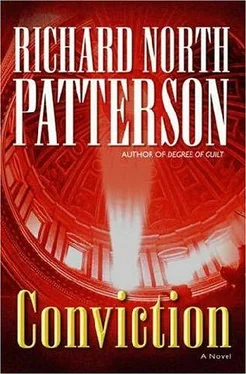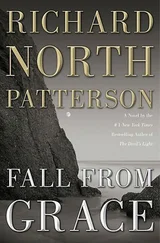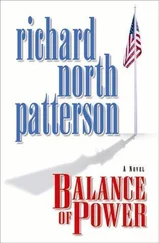Richard Patterson - Conviction
Здесь есть возможность читать онлайн «Richard Patterson - Conviction» весь текст электронной книги совершенно бесплатно (целиком полную версию без сокращений). В некоторых случаях можно слушать аудио, скачать через торрент в формате fb2 и присутствует краткое содержание. Жанр: Старинная литература, на английском языке. Описание произведения, (предисловие) а так же отзывы посетителей доступны на портале библиотеки ЛибКат.
- Название:Conviction
- Автор:
- Жанр:
- Год:неизвестен
- ISBN:нет данных
- Рейтинг книги:3 / 5. Голосов: 1
-
Избранное:Добавить в избранное
- Отзывы:
-
Ваша оценка:
- 60
- 1
- 2
- 3
- 4
- 5
Conviction: краткое содержание, описание и аннотация
Предлагаем к чтению аннотацию, описание, краткое содержание или предисловие (зависит от того, что написал сам автор книги «Conviction»). Если вы не нашли необходимую информацию о книге — напишите в комментариях, мы постараемся отыскать её.
Conviction — читать онлайн бесплатно полную книгу (весь текст) целиком
Ниже представлен текст книги, разбитый по страницам. Система сохранения места последней прочитанной страницы, позволяет с удобством читать онлайн бесплатно книгу «Conviction», без необходимости каждый раз заново искать на чём Вы остановились. Поставьте закладку, и сможете в любой момент перейти на страницу, на которой закончили чтение.
Интервал:
Закладка:
CONVICTION
Richard North Patterson
RANDOM HOUSE
NEW YORK
For Gina Centrello
and
Nancy Miller
From this day forward, I no longer shall tinker with the machinery of death. . . . Rather than continue to coddle the Court's delusion that the desired level of fairness has been achieved and the need for regulation eviscerated, I feel morally and intellectually obligated simply to concede that the death penalty experiment has failed. . . . The basic question—does the system accurately and consistently determine which defendants "deserve" to die?—cannot be answered in the affirmative. It is not simply that this Court has allowed vague aggravating circumstances to be employed . . . relevant mitigating evidence to be disregarded . . . and vital judicial review to be blocked. . . . The problem is that the inevitability of factual, legal and moral error gives us a system that we know must wrongly kill some defendants, a system that fails to deliver the fair, consistent, and reliable sentences of death required by the Constitution.
—MR. JUSTICE BLACKMUN, dissenting in Callins v. Collins
Justice Blackmun begins his statement by describing with poignancy the death of a convicted murderer by lethal injection. He chooses, as the case in which to make that statement, one of the less brutal of the murders that regularly come before us—the murder of a man ripped by a bullet suddenly and unexpectedly, with no opportunity to prepare himself and his affairs, and left to bleed to death on the floor of a tavern. The death-by-injection which Justice Blackmun describes looks pretty desirable next to that. It looks even better next to some of the other cases currently before us which Justice Blackmun did not select as the vehicle for his announcement that the death penalty is always unconstitutional—for example, the case of the eleven year old girl raped by four men and killed by stuffing her panties down her throat. . . . How enviable a quiet death by lethal injection compared with that! If the people conclude that such more brutal deaths may be deterred by capital punishment; indeed, if they merely conclude that justice requires such brutal deaths to be avenged by capital punishment, the creation of false, untextual, and unhistorical contradictions within "the Court's Eighth Amendment jurisprudence" should not prevent them.
—MR. JUSTICE SCALIA, concurring in Callins v. Collins
It is tempting to pretend that [those] on death row share a fate in no way connected to our own. . . . Such an illusion is ultimately corrosive, for the reverberations of injustice are not so easily confined. . . . [T]he way in which we choose those who will die reveals the depth of moral commitment among the living.
—MR. JUSTICE BRENNAN, dissenting in McCleskey v. Kemp
PART ONE
THE TRIAL
ONE
IN FIFTY-NINE DAYS, IF THE STATE OF CALIFORNIA HAD ITS WAY, the man inside the Plexiglas booth would die by lethal injection.
Teresa Peralta Paget paused to study him, the guard quiet at her side. Her new client stood with his back to them. He was bulky, the blue prison shirt covering his broad back like an oversize bolt of cloth. A picture of enthrallment, he gazed through the high window of the exterior wall at the San Francisco Bay, its water glistening in the afternoon sun. She was reluctant to distract him; the man's sole glimpses of the world outside, Terri knew, occurred when his lawyers came to see him.
The others were out of it now; the last set of lawyers had withdrawn after their latest defeat. The final desperate efforts to keep Rennell Price alive—what she thought of as the ritual death spasms ordained by the legal system—had fallen to Teresa Paget. This was their first meeting: but for his solitude, she could not have picked her client out from the other men huddled with their lawyers in the two rows of Plexiglas cubicles. It resembled, Terri thought, an exhibit of the damned—sooner or later, in months, or more likely years, the impersonal, inexorable grinding of the machinery of death would consume each one in turn.
But perhaps not, Terri promised herself, this one. At least not until she had burnt herself down to the nerve ends, sleep-deprived from the effort to save him.
To her new client, she supposed, Terri might appear a mere morsel for the machine, insufficient even to slow its gears. She was small—barely five feet four—and slight, with olive skin and a sculpted face, which her husband stubbornly insisted was beautiful: high cheekbones; a delicate chin; a ridged nose too pronounced for her liking; straight black hair, which, in Terri's mind, she shared with several million other Latinas far more striking than she. There was little about her to suggest the steeliness an inmate might hope for in his lawyer except, perhaps, the green-flecked brown eyes, which even when she smiled never quite lost their keenness, or their watchfulness.
This wariness was Terri's birthright, the reflex of a child schooled by the volatile chemistry which transformed her father's drinking to brutality, and reinforced by the miserable first marriage which Terri, who had no better model, had chosen as the solution to her pregnancy with Elena. Her personal life was different now. As if to compensate for this good fortune, she had turned her career down a path more arduous than most lawyers could endure: at thirty-nine, she had spent the last seven years representing death row inmates, a specialty which virtually guaranteed the opposition and, quite frequently, the outright hostility of judges, prosecutors, witnesses, cops, governors, most relatives of the victim, and by design, the legal system itself—not to mention, often, her own clients. Now that stress and anxiety no longer waited for her at home, Terri sometimes thought, she had sought them out.
What would be most stressful about this client was not the crime of which he stood convicted, though it was far more odious than most—especially, given certain facts, to Terri herself. Nor was it whatever version of humanity this man turned out to be: her death row clients had run the gamut from peaceable through schizophrenic to barking mad. But this client represented the rarest and most draining kind of all: for fifteen years, through a trial court conviction in 1987, then a chain of defeats in the California Supreme Court, the Federal District Court, the Federal Court of Appeals, and the United States Supreme Court, Rennell Price had claimed his innocence of the crime for which the state meant to kill him.
No court had considered this claim worthy of belief or even, in the last five of these proceedings, a hearing. As far as the State was concerned, its sole remaining task should be to dispatch three psychiatrists to advise the Governor's office, within twenty days of the appointed date of execution, whether her client was sane enough to die: one of the niceties of capital punishment, Terri thought sardonically, was the State's insistence that the condemned fully appreciate that lethal injection would, in fact, be lethal.
She nodded to the guard.
He rapped sharply on the Plexiglas. With a twitch of his shoulders, as though startled, the black man inside the cage turned to face them.
His eyes were expressionless; for him, Terri thought, the highlight of her visit—a view of the bay—was already over. With a resignation born of fifteen years of meeting lawyers in these booths, he backed toward the door and, hands held behind his back, thrust them through an open slot.
The guard clapped on his handcuffs, closing them with a metallic click. Then Rennell Price, shackled, stepped away from the door.
The guard opened it, admitting Terri.
The door shut, and Rennell stood over her. As he backed to the slot again, waiting for the guard to uncuff his outthrust hands, Terri had an involuntary spurt of fear, the reflex of a small woman confined with a hulking stranger who had, in the estimate of twelve jurors, done a terrible thing to someone much smaller than she.
Читать дальшеИнтервал:
Закладка:
Похожие книги на «Conviction»
Представляем Вашему вниманию похожие книги на «Conviction» списком для выбора. Мы отобрали схожую по названию и смыслу литературу в надежде предоставить читателям больше вариантов отыскать новые, интересные, ещё непрочитанные произведения.
Обсуждение, отзывы о книге «Conviction» и просто собственные мнения читателей. Оставьте ваши комментарии, напишите, что Вы думаете о произведении, его смысле или главных героях. Укажите что конкретно понравилось, а что нет, и почему Вы так считаете.












